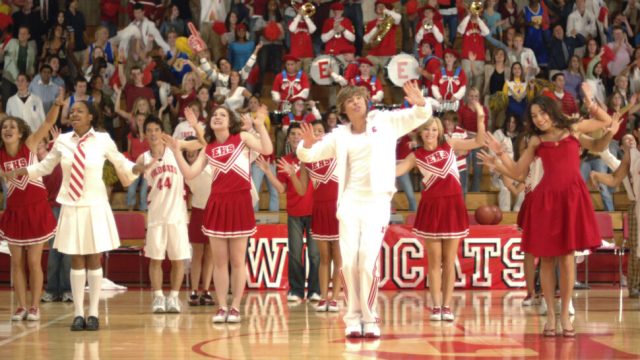I wish my life could be like a high school musical.
That lyric may be from High School Musical 3, but it perfectly encapsulates why so many people loved the original, a small-scale TV movie that no one expected to birth a phenomenon in the mid-2000s. Offsetting the more lavish (and mostly darker) musicals hitting theatres in the same time period, High School Musical sold its audience a corny but supremely appealing story about star-crossed teen lovers trying to audition for a school musical, and it charmed the world.
The plot is simple: Troy Bolton, the star basketball player of the East High Wildcats, meets Gabriella Montez, gifted student and Academic Decathlon champion, at a ski lodge when they sing karaoke together. When they find themselves in the same classlater that month, their desire to sing together leads them to audition for the fall musical Twinkle Town — which sets off a full-blown culture war at East High, led by the Drama Club’s star performers, twins Sharpay and Ryan Evans. Despite the conniving siblings’ — and Troy and Gabriella’s selfish friends’ — attempts to break the couple apart, they manage to triumph over their school’s social stigmas and audition. Their audition manages to win the hearts of the entire school, and everyone realizes they don’t have to show only one side of themselves to the world.
Sure, it’s very easy to make fun of High School Musical. Everything in the plot is treated with incredible earnestness, despite being patently ridiculous. Troy and Gabriella are treated like social deviants for the obviously scandalous act of…wanting to have more than one after-school activity. The student body spends a whole song demanding that everyone “Stick to the Status Quo” instead of rocking the boat by admitting they have more than one hobby. The mere desire to audition for a musical leads Troy and Gabriella’s friends Chad and Taylor to actively sabotage their relationship. That escalates to melodrama of the highest order in the next scene with Gabriella’s mournful breakup song “When There Was Me and You,” which sees her singing about how her heart is irrevocably broken while leaning against a giant poster of Troy hanging in the school hallway. Camp abounds, and not just when Ryan and Sharpay are onscreen hamming things up.
But that same earnestness makes High School Musical compelling to me — there isn’t a whole lot like it. Zac Efron and Vanessa Hudgens’ palpable chemistry, established firmly in the film’s first song, their duet “Start of Something New,” makes it easy to root for Troy and Gabriella to stay together. The title and lyrics are incredibly on-the-nose, but what starts as an awkward forced bonding activity between the two teens becomes a celebration of the unknown that lies ahead, bright and anticipatory. It makes us want to see more of what these two people can do together, and sets the groundwork for us to root for them as they fight everyone they know and love to earn the “right” to just sing a damn song.
The music goes a long way in selling the story. Describing the plot importance of “Stick to the Status Quo” makes it sound absolutely ludicrous, but the way the song builds both lyrically, from one basketball player named Zeke admitting that he has his own secret hobby just like Troy to the entire student body exploding in misguided rage over Troy and Gabriella disrupting East High’s social ecosystem, and musically, with sparse instrumentation giving way to a full orchestral boom when the student body loses their minds over Troy and Gabriella’s slights, makes it a full showstopper. Sharpay and Ryan’s performances of “What I’ve Been Looking For” and “Bop to the Top,” full of slick showmanship and braggadocio, say as much about them as Troy and Gabriella’s more plaintive, reserved methods of expression. And the final eventual audition song, “Breaking Free,” finally allows Troy and Gabriella to truly soar, letting go of all reservations and simply being themselves.
When this movie came out, I was actually in high school. I did recognize that the world of High School Musical had very little resemblance to reality, but especially at that uncomfortable age, there was a real appeal in being shown that you didn’t have to exist in one particular box. The lessons about seeking your own happiness and “breaking free” of social expectation are played just as earnestly as everything before it, and because of that, that earnestness flips from ridiculousness to a vital part of the movie’s charm. The film’s world is ludicrous, but it’s the kind of ludicrous you want to be a part of if it means being able to celebrate in the same wondrous way Troy and Gabriella do in “Breaking Free,”
I fell immediately in love with the franchise because of that earnestness. It remained absolutely ridiculous through its entire run — the second movie is literally about Troy’s friends torpedoing his college chances because they’re annoyed he’s networking instead of always hanging out with them, and the third somehow ends with Ryan at fucking Juilliard — but its charm remained intact because its worldview never faltered. Troy and Gabriella will always find each other through song, a bit of music will help you articulate all of your feelings and get you through them, and the villains in your life will just sing-battle with you until they realize that you’re pretty okay and soften up. In that way, the movie is just like my memories of being in actual high school musicals. I can cringe looking back at some of the things I deemed serious concerns, but those days and moments truly felt like the start of something new for me.
I do genuinely wish sometimes that my world was like High School Musical.

